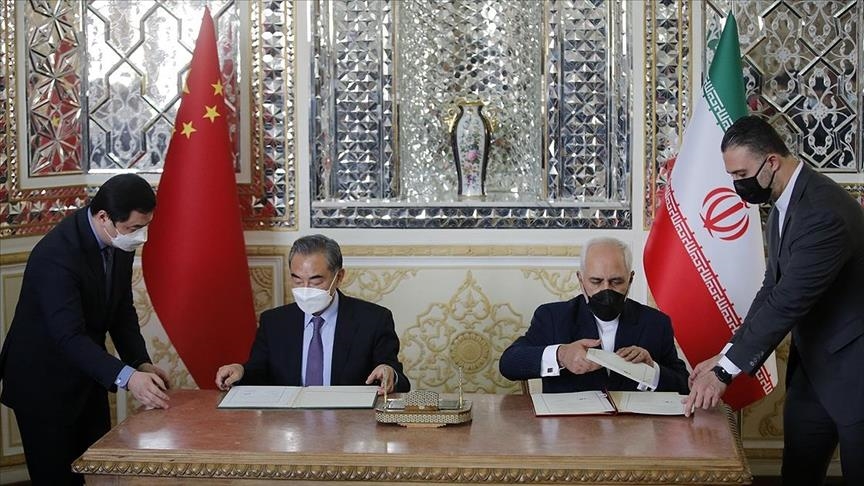Iran, China sign deal on ‘Belt and Road’ project
$400 billion deal paves the way for Iran's participation in “Belt and Road” Initiative

TEHRAN, Iran
Iran and China signed a much-anticipated 25-year strategic cooperation agreement on Saturday, as part of China’s “Belt and Road” initiative.
The document was signed by Iran’s Foreign Minister Javad Zarif and his Chinese counterpart Wang Li in a ceremony in Tehran attended by top officials of the two countries.
Wang arrived in the Iranian capital Friday on a two-day visit as part of his regional tour, which comes at a time of heightened tensions between China and the US.
The cooperation agreement aims to bolster economic cooperation between Tehran and Beijing and paves the way for Iran's participation in the “Belt and Road” Initiative, a massive infrastructure project stretching from East Asia to Europe, with a focus on the private sector.
Cooperation in the defense sector, according to sources, is also part of the long-time agreement, which is significant given growing tensions with the West and recent joint military drills in the Persian Gulf region.
A joint statement issued after signing the agreement said the two sides aim to "promote the development and comprehensive strategic partnership" through this deal.
The $400 billion deal had been on anvil since January 2016 when Chinese President Xi Jinping became the first world leader to visit Iran following the signing of the 2015 nuclear accord between Iran and world powers.
In June 2020, four years after the proposal was first pitched, the Iranian government said the agreement was based on a “win-win approach”, after some opposition figures criticized it as a “secretive” agreement.
The deal had also come under the shadow of US sanctions, after reports suggested that China was reluctant to wrap up the deal before the outcome of the US presidential election.
In a statement on Friday, Iran’s Foreign Ministry spokesman Saeed Khatibzadeh said the agreement seeks to take the Iranian-Chinese relations “to a strategic and comprehensive level”.
Pertinently, Wang’s visit to Tehran coincides with the 50th anniversary of diplomatic relations between Iran and China.
Building coalitions
The top Chinese diplomat, who visited Saudi Arabia and Turkey before arriving in Tehran, held a series of meetings with senior Iranian officials on Saturday.
The first meeting was held with former Parliament Speaker Ali Larijani, who had been tasked with assisting the Hassan Rouhani government in finalizing the strategic pact.
Larijani, the country’s longest-serving parliament speaker and one of the contenders for upcoming presidential polls, was chosen to negotiate the deal with Chinese officials for having “good personal rapport” in Beijing, a source said.
During the meeting on Saturday, the two officials “reviewed the agreement and reaffirmed commitment to deepen economic and diplomatic ties”, according to sources.
Wang also held meetings with President Rouhani and Foreign Minister Javad Zarif, during which issues of mutual interest came up for discussion.
Rouhani stressed the need to “accelerate the implementation of operational agreements on infrastructure projects”, and called for “developing and deepening” ties between the two countries, his office said.
Rouhani’s top aide Hesamuddin Ashna termed the long-term pact an “example of successful diplomacy” between the two countries, while stressing “building coalitions”.
Wang and Zarif also attended an exhibition on Saturday afternoon at the Foreign Ministry complex to mark the semi-centennial celebrations of Iran-China diplomatic ties.
China-US tension
The visit of the top Chinese diplomat Tehran as part of his regional tour and the signing of a long-term cooperation pact come in the wake of simmering tensions between Beijing and Washington.
Iranian envoy to China, Mohammad Keshavarzzadeh, on Thursday said the visit was of “great importance”, which he said came days after “challenging talks” between China and the US.
The top diplomats of China and US had a face-off in Alaska earlier this month, which marked a new low in their already fragile diplomatic ties.
Following the Alaska showdown, Wang played host to his Russian counterpart Sergei Lavrov in Beijing, during which the two sides reportedly discussed ways to counter the US.
Keshavarzzadeh said Iran has always recognized “unified China” and rejects any “interference in internal affairs of the country,” in oblique reference to criticism of China’s persecution of Uighurs in north-western Xinjiang province.
China has in turn backed Iran’s position on the 2015 nuclear pact, calling on the US and its European allies to “take practical steps and restart talks” to end the impasse.
The stalemate over the nuclear deal continues between Iran and the US, with both sides unwilling to make the first move. The two sides have been engaged in verbal wrangling in recent weeks.
Anadolu Agency website contains only a portion of the news stories offered to subscribers in the AA News Broadcasting System (HAS), and in summarized form. Please contact us for subscription options.







